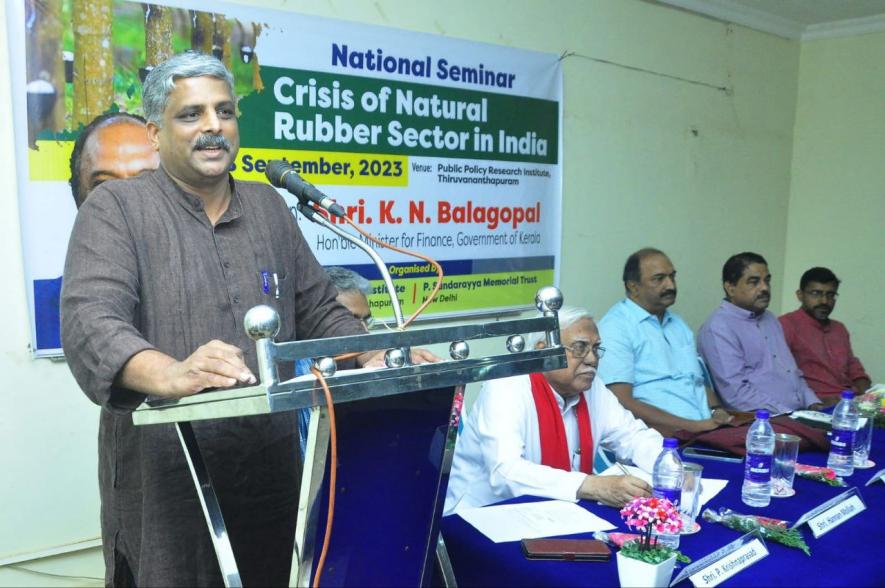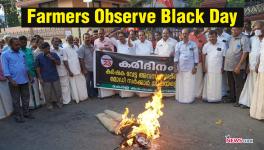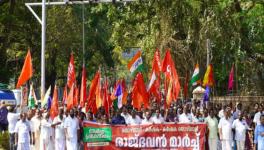Kerala: Policy-Driven Crisis Hitting Rubber Sector, Industry Revival Policy Change Needed
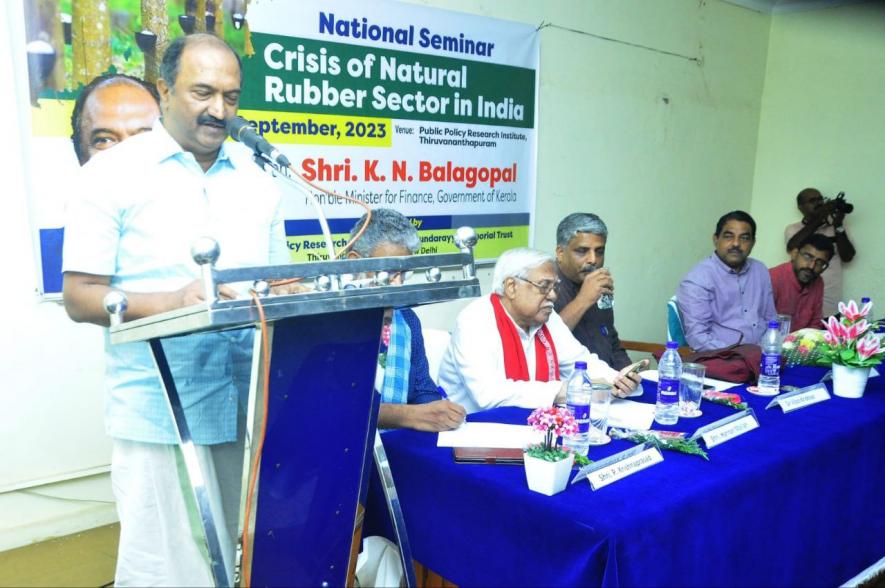
K N Balagopal, the finance minister of Kerala, inaugurating the two-day national seminar.
The two-day national seminar on the ‘Crisis of Natural Rubber Sector in India’ in Thiruvananthapuram on September 7 and 8 highlighted the ‘policy-driven crisis’ affecting the sector. The seminar deliberated in detail about the impact on the rubber economy after implementing the neo-liberal policies. India entered into trade agreements leading to high import of cheap synthetic rubber, the crunch faced by the small farmers and falling prices in the last three decades.
The seminar, organised by the P Sundarayya Memorial Trust (PSMT) and held in the Public Policy Research Institute (PPRI), Thiruvananthapuram, saw the coming together of farmers, workers, planters, small traders, Kisan (Farmer) leaders, scientists and researchers for the first time for a detailed deliberation on the vital sector.
Concerns were raised on the reduced rubber yield, delayed maturity of trees, the dominance of corporates s and the collaboration of the major tyre companies in reducing rubber prices, leading to a telling effect on the farmers. A demand for the distribution of Rs 1,788 crore penalty levied on five major tyre manufacturing companies for alleged cartelisation was raised.
The idea to pursue an alternate model by changing the character of the industry from corporatisation to cooperation was also mooted, benefitting the producer, manufacturer and consumer.
‘A POLICY-DRIVEN CRISIS’
Rubber cultivation is spread across the states bordering the Western Ghats, including Kerala, a few districts in Tamil Nadu and Karnataka, besides the Northeastern states, including Tripura and Assam. The falling prices have severely affected the farmers, even leading to temporary stoppage of tapping.
The Union government refused not only to ensure a Minimum Support Price (MSP) but also to restrict rubber imports, citing trade agreements. Further, the exploitation of farmers came to the fore when the Competition Commission of India (CCI) imposed a fine of Rs 1,788 crore on five premiere tyre companies: Apollo Tyres Ltd, MRF Ltd, CEAT Ltd, JK Tyre & Industries Ltd and Birla Tyres Ltd, for creating a cartel to reduce the rubber price.
Inaugurating the seminar, K N Balagopal, the finance minister of Kerala, referred to the agreements, including the Association of South East Asian Nations (ASEAN)- India Free Trade Agreement, as having negatively impacted the sector. The finance minister said the intervention of the Left Democratic Front (LDF) government had provided a stabilisation price for rubber farmers.
Presiding over the inaugural session, the general secretary of All India Kisan Sabha (AIKS), Vijoo Krishnan, spoke about the policy-driven crisis and the sufferings of the small-scale commodity producers and wage labourers.
Vijoo Krishnan spoke about the policies pursued by the BJP and Congress governments since 2009 affecting the rubber sector.
Speaking witn NewsClick, Krishnan said dumping of cheap rubber in the country due to the free trade agreements was leading to the price depression for farmers and landfall profits for corporates. “The price of 1 kg rubber has fallen to Rs 120 now from Rs 240 a decade back. This is purely due to the faulty policies pursued by the BJP and Congress governments,” he said.
Further, with the destructive policies, the farmers also suffer from a shortage of skilled labourers for tapping invasive diseases, resulting in delayed maturity and falling yield. The average yield per tree is estimated between 6 kg and 8kg, but this has fallen to under 3 kg, which is considered another setback to small farmers.
‘NEED TO SHIFT TO COOPERATION FROM CORPORATION’
The falling rubber prices have resulted in the farmers refraining from tapping latex from rubber trees. However, experts, while presenting papers in the seminar, noted that such a move would adversely affect the yield, further intensifying the loss to the farmers.
P Krishnaprasad, the finance secretary of the AIKS and trustee of the PSMT, insisted on petty producers coming together and forming cooperative organisations under the worker's self-management system.
“Through cooperatives -- producers, market and production cooperative -- we shall be able to overcome the crisis. The farmers must be mobilised to create awareness about the importance and need to form such cooperatives to overcome the exploitation of the corporates,” he told NewsClick.
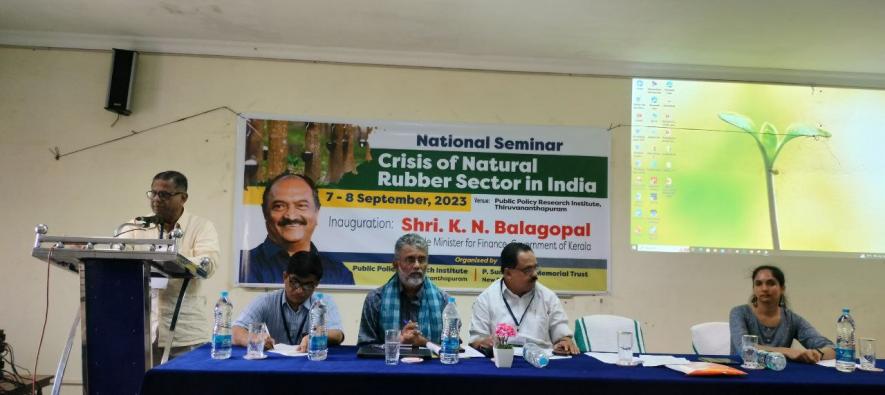
Pabitra Kar, former deputy speaker of Tripura assembly and AIKS leader, spoke about the BJP government's policies in the state.
P K Viswanathan, principal of the School of Business, Amrita Vishwa Vidyapeetham, proposed alternative systems for the farmers to overcome the crisis. “Rubber-integrated farming can be adopted by the farmers, which will reduce the farm level vulnerability, but at the cost of productivity,” he said.
The network the major rubber-producing countries created in Southeast Asia has ensured fair prices for the local producers. Still, India is not part of the network, leading to a massive setback for farmers. The seminar also called upon the union government to extend subsidies to the farmers, like several Southeast Asian nations and countries like Laos and Cambodia.
While affecting the farmers, the falling rubber prices have resulted in massive profits for the tyre manufacturing companies. Nidheesh Villat, a researcher with the PSMT, pointed to corporations making profits at the cost of the farmers and consumers.
“Farmers' income has fallen drastically, but the net worth of the major tyre manufacturing companies has increased manifold in the past 10 years,” he said.
The seminar urged the Union government to consider revising the policies to aid the rubber farmers in overcoming the crisis and for the revival of the sector.
Get the latest reports & analysis with people's perspective on Protests, movements & deep analytical videos, discussions of the current affairs in your Telegram app. Subscribe to NewsClick's Telegram channel & get Real-Time updates on stories, as they get published on our website.









